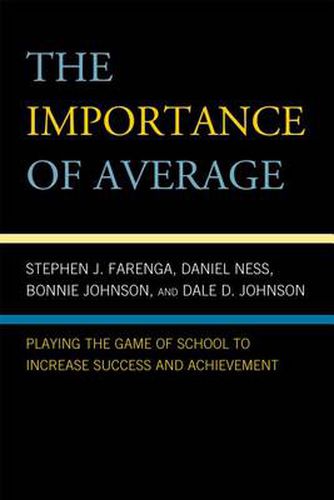Readings Newsletter
Become a Readings Member to make your shopping experience even easier.
Sign in or sign up for free!
You’re not far away from qualifying for FREE standard shipping within Australia
You’ve qualified for FREE standard shipping within Australia
The cart is loading…






The Importance of Average calls attention to the policies and practices that discriminate against the silent majority of students in the American educational system. Arguments presented emphasize the collateral damage caused to average students by legislative mandates, administrative policies, teaching practices, parenting beliefs, and adherence to strict psychological constructs. Each of these factors has created a pervasive psycho-educational belief of average ability. The authors challenge what they consider as a pseudo-definition of ‘average’ that was brought about as an attempt by policymakers to test their way out of addressing the true inequities found in society. Further, the authors identify how educational policymakers have sacrificed the education of an entire class of students by creating the illusion that underachievement can be eliminated simply through lowering standards and examination pass rates. In chronicling the plight of average students, the authors capture the emotions and attitudes of teachers, parents, and students whose frustrations have been set aside in order to meet other special interests. The authors explore methods that provide students of average knowledge in any given area with the appropriate tools necessary for succeeding in school. Finally, the authors argue that there is no such thing as ‘average’ intelligence.
$9.00 standard shipping within Australia
FREE standard shipping within Australia for orders over $100.00
Express & International shipping calculated at checkout
The Importance of Average calls attention to the policies and practices that discriminate against the silent majority of students in the American educational system. Arguments presented emphasize the collateral damage caused to average students by legislative mandates, administrative policies, teaching practices, parenting beliefs, and adherence to strict psychological constructs. Each of these factors has created a pervasive psycho-educational belief of average ability. The authors challenge what they consider as a pseudo-definition of ‘average’ that was brought about as an attempt by policymakers to test their way out of addressing the true inequities found in society. Further, the authors identify how educational policymakers have sacrificed the education of an entire class of students by creating the illusion that underachievement can be eliminated simply through lowering standards and examination pass rates. In chronicling the plight of average students, the authors capture the emotions and attitudes of teachers, parents, and students whose frustrations have been set aside in order to meet other special interests. The authors explore methods that provide students of average knowledge in any given area with the appropriate tools necessary for succeeding in school. Finally, the authors argue that there is no such thing as ‘average’ intelligence.